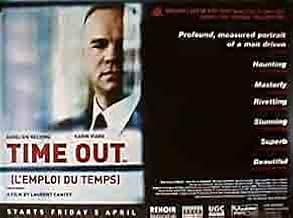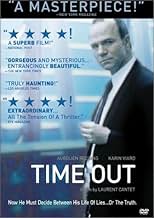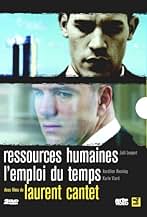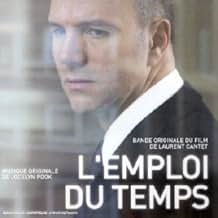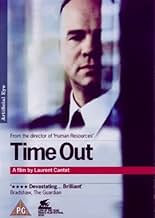IMDb-BEWERTUNG
7,3/10
5166
IHRE BEWERTUNG
Füge eine Handlung in deiner Sprache hinzuAn unemployed man finds his life sinking more and more into trouble as he hides his situation from his family and friends.An unemployed man finds his life sinking more and more into trouble as he hides his situation from his family and friends.An unemployed man finds his life sinking more and more into trouble as he hides his situation from his family and friends.
- Regie
- Drehbuch
- Hauptbesetzung
- Auszeichnungen
- 3 Gewinne & 8 Nominierungen insgesamt
Didier Reyes
- Philippe
- (as Didier Perez)
Empfohlene Bewertungen
Time Out is, in essence, a psychological study of a man who is in "denial" after he loses his job as a Financial Consultant and resorts to lies and deception to keep up the pretense of employment for the sake of his family. Yet it is also a searing portrait of the failure of the workplace to provide a nurturing environment for people (not a theme much explored in the Hollywood assembly line these days).
Time Out is a subtle, involving, and truly perceptive film that deals with the shallow, conformist world of middle management. It depicts how an individual's identity can be so wrapped up in what they do that they can scarcely remember who they really are and what is most meaningful in their life. As Jonathan Rosenbaum has pointed out, it is reminiscent of Melville's "Bartelby the Scrivener" in its depiction of a banal middle-aged businessman who would just prefer not to tell the truth.
Aurélien Recoing (a popular French stage actor) plays Vincent, who is so detached from reality he goes through the motions of pretending to work for the United Nations on a development mission. His "job" is conveniently based away from his wife and three children in Switzerland. Here he spends his hours driving around in his car, going in and out of hotels and conference rooms, exerting as much energy in his pretense as he would if he were actually working. I think the point is that his "pretend" job is different only in degree from his former "real" one.
Cantet uses the business world with its offices, hotels, and associates to portray an individual whose day-to-day activity consists only in constructing a false life. Vincent has to resort to obtaining money under false pretenses from his friends and his father and to assist a petty criminal in his smuggling attempts. For all his lies, Vincent confesses how suffocating his job has been. "I don't know what I'm supposed to do," he cries to his wife, under the pretense of discussing his non-existent new position.
As he stands on the outside looking in, he slowly loses touch with everything that has given his life meaning. His family, who he truly loves, also cannot provide the emotional support he needs. The impression is that the lack of emotional expression, the failure to communicate, and the skimming along on the surface of life is not new to this family. These are the same people who live next door to you, always happy and smiling who seem to have it together until a crisis comes. Then, they have no inner strength to deal with it.
Time Out is a subtle, involving, and truly perceptive film that deals with the shallow, conformist world of middle management. It depicts how an individual's identity can be so wrapped up in what they do that they can scarcely remember who they really are and what is most meaningful in their life. As Jonathan Rosenbaum has pointed out, it is reminiscent of Melville's "Bartelby the Scrivener" in its depiction of a banal middle-aged businessman who would just prefer not to tell the truth.
Aurélien Recoing (a popular French stage actor) plays Vincent, who is so detached from reality he goes through the motions of pretending to work for the United Nations on a development mission. His "job" is conveniently based away from his wife and three children in Switzerland. Here he spends his hours driving around in his car, going in and out of hotels and conference rooms, exerting as much energy in his pretense as he would if he were actually working. I think the point is that his "pretend" job is different only in degree from his former "real" one.
Cantet uses the business world with its offices, hotels, and associates to portray an individual whose day-to-day activity consists only in constructing a false life. Vincent has to resort to obtaining money under false pretenses from his friends and his father and to assist a petty criminal in his smuggling attempts. For all his lies, Vincent confesses how suffocating his job has been. "I don't know what I'm supposed to do," he cries to his wife, under the pretense of discussing his non-existent new position.
As he stands on the outside looking in, he slowly loses touch with everything that has given his life meaning. His family, who he truly loves, also cannot provide the emotional support he needs. The impression is that the lack of emotional expression, the failure to communicate, and the skimming along on the surface of life is not new to this family. These are the same people who live next door to you, always happy and smiling who seem to have it together until a crisis comes. Then, they have no inner strength to deal with it.
People may lie for the thrill of being appreciated, or out of the fear of not being so; but while a fantasy world may initially seem liberating, it can become a prison as well. These themes are explored in 'Time Out', the story of Vincent, a man who loses his job and pretends he hasn't, rather than face up to the truth. There's a nice absence of didacticism in the way this film is assembled, a rich picture is assembled but without any attempt to ram a single interpretation down the audience's throat; it adds up to a fine portrait of depression, and a loneliness that oddly can exist only within a relationship. But there's also a creativeness in Vincent's behaviour which is necessary to generate the plot but which doesn't quite square with the rest of the movie: the film is more convincing once Vincent is deeply trapped in the web of his own lies, rather than when he is spinning it. At the heart of 'Time Out', Vincent remains an enigma unclarified: it is this that is both the film's strength and weakness. It's not a perfect film, and the start is quite dull, but the longer it lasts, the deeper it feels.
A middle-aged middle class family man has a mid-life crisis.
Hardly an inspiring or original idea, yet Laurent Cantet creates a quite devastating and compelling landscape of one man's internal terror - terror at his situation and complete inability to express his feelings.
Through Cantet, a combination of economic script, astonishingly sparse and subtle performances, and Pook's deeply moving musical score, takes the viewer on a journey of displaced despair and futile attempts to paper over the cracks. Recoing is captivating, his face a turmoil of quiet bewilderment and pain, and he is ably matched by Viard as his increasingly unsettled partner. The penultimate scene between Recoing, Viard and their children is quite astonishing for its tension and disquiet.
In the end, however, the final scene says it all. Recoing's face tells us everything we need to know, and he really should have won every award going for this brilliant performance. Once again the French film industry shows us all how to make films.
Hardly an inspiring or original idea, yet Laurent Cantet creates a quite devastating and compelling landscape of one man's internal terror - terror at his situation and complete inability to express his feelings.
Through Cantet, a combination of economic script, astonishingly sparse and subtle performances, and Pook's deeply moving musical score, takes the viewer on a journey of displaced despair and futile attempts to paper over the cracks. Recoing is captivating, his face a turmoil of quiet bewilderment and pain, and he is ably matched by Viard as his increasingly unsettled partner. The penultimate scene between Recoing, Viard and their children is quite astonishing for its tension and disquiet.
In the end, however, the final scene says it all. Recoing's face tells us everything we need to know, and he really should have won every award going for this brilliant performance. Once again the French film industry shows us all how to make films.
This is a purely awesome film, the best of Laurent Cantet, the movie that reavealed him, and the best role ever from Aurélien Recoing. This is inspired from actual events,a nd this very same story was remade one year later with Daniel Auteuil: L'ADVERSAIRE. Both are terrific but not sjown in the same manner. The 2002 film from Nicole Garcia was more criminal oriented. Here, you are glued, stuck to this riveting tale. You always wonder what will happen in the next scene. An outstanding drama, involving normal folks to whom happens something really terrible. Top of the top. One of the best dramas ever. Serge Livrozet, this non professional actor, gives here a jaw dropping short but unique performance. The amazing story of a man more and more prisoner of his own lies.
Playing authority figures in dark suits, the actor Stellan Skarsgard always suggests a noble melancholy, a weatherbeaten soul underneath his Swedish-oil-exec good looks. William H. Macy has made a career out of essaying the disappointments of pride-in-professionalism white men. Aurelien Recoing, the hero of Laurent Cantet's L'EMPLOI DU TEMPS, doesn't summon the instant empathy we feel for those actors. Cantet is a schematist in the style of Arthur Miller: without Miller's cornballs, but also without his visceral punch. Recoing's very body seems to be a manifestation of Cantet's two-sided patness. From the front, Recoing has some of the bland, boyish-haired handsomeness of a Skarsgard or a young Klaus Maria Brandauer. From the back, balding and bearlike-hulking, Recoing is a monster or a wreck. Cantet's movies--old-school, slowly downhill-rolling tragedies about the inhumanity of late capitalism--use Jekyll-and-Hyde dichotomies for thudding dramatic effects.
Recoing's Vincent has lost his job as a management consultant. Instead of getting another one, he drives around, hangs out in office-building lobbies and hotel bars, and generally dresses and comports like an upper-middle-class Frenchman. When he starts dreaming up a fantasy job--bringing bucks to developing markets in the Third World via the U.N.--he starts taking money from all-too-eager friends to invest. Then a middle-class mobster is onto Vincent's scheme. And from there...before you can say FARGO, the cards come tumblin' down.
Like Cantet's last movie, HUMAN RESOURCES, we are meant to hate the game, not the player, and to believe that a rigged, soulless system has robbed Cantet's characters of their capacity to experience joy on earth. But what does this character want, exactly? At one moment, he seems to genuinely wish he had the idealistic U.N. job--something, at his stage of life, with his background in the for-profit world, he could never attain. At other moments he seems to want to drive around the snowy countryside and listen to golden oldies. At still others, he seems to enjoy, a la Kevin Spacey in AMERICAN BEAUTY, the undemanding work of selling hot stereos and toasters for his mafia friend. And yet Cantet has designed the movie to make it seem as if the need for status, for patriarchal prestige, has led Vincent into the fantasy land that is his undoing. The ending--a softer landing than you might be expecting--is meant to be soul-chilling.
But what's the big whip? Everyone has dreamed of a life of aimless rambling; those who have it never seem very happy with it. (Cantet could've tested his ideas if he had bought Vincent a ticket to a lazybones' paradise.) And Cantet underlines the irony that Vincent's hustling to keep himself in non-work is in itself a more than full-time job. Cantet's movies struggle for a Miller-like inevitability, but they always fail to persuade on a human level; his crushed heroes seem more constructs than creatures. One brilliantly observant (and shudder-inducingly cruel) moment: Vincent's wife catches on to his ruse when he brings a buddy from the office to dinner--a pockmarked hustler who is too low-class to inhabit the highflown world Vincent pretends to have a berth in. The jig is up for Vincent because his wife's snob meter goes off. Too bad nothing else is as acutely examined or observant.
Recoing's Vincent has lost his job as a management consultant. Instead of getting another one, he drives around, hangs out in office-building lobbies and hotel bars, and generally dresses and comports like an upper-middle-class Frenchman. When he starts dreaming up a fantasy job--bringing bucks to developing markets in the Third World via the U.N.--he starts taking money from all-too-eager friends to invest. Then a middle-class mobster is onto Vincent's scheme. And from there...before you can say FARGO, the cards come tumblin' down.
Like Cantet's last movie, HUMAN RESOURCES, we are meant to hate the game, not the player, and to believe that a rigged, soulless system has robbed Cantet's characters of their capacity to experience joy on earth. But what does this character want, exactly? At one moment, he seems to genuinely wish he had the idealistic U.N. job--something, at his stage of life, with his background in the for-profit world, he could never attain. At other moments he seems to want to drive around the snowy countryside and listen to golden oldies. At still others, he seems to enjoy, a la Kevin Spacey in AMERICAN BEAUTY, the undemanding work of selling hot stereos and toasters for his mafia friend. And yet Cantet has designed the movie to make it seem as if the need for status, for patriarchal prestige, has led Vincent into the fantasy land that is his undoing. The ending--a softer landing than you might be expecting--is meant to be soul-chilling.
But what's the big whip? Everyone has dreamed of a life of aimless rambling; those who have it never seem very happy with it. (Cantet could've tested his ideas if he had bought Vincent a ticket to a lazybones' paradise.) And Cantet underlines the irony that Vincent's hustling to keep himself in non-work is in itself a more than full-time job. Cantet's movies struggle for a Miller-like inevitability, but they always fail to persuade on a human level; his crushed heroes seem more constructs than creatures. One brilliantly observant (and shudder-inducingly cruel) moment: Vincent's wife catches on to his ruse when he brings a buddy from the office to dinner--a pockmarked hustler who is too low-class to inhabit the highflown world Vincent pretends to have a berth in. The jig is up for Vincent because his wife's snob meter goes off. Too bad nothing else is as acutely examined or observant.
Wusstest du schon
- WissenswertesInspired by a true story, that of Jean-Claude Romand. In reality, Romand went on to kill, on January 9, 1993, his wife, two children and both his parents. It is the first of three films in two years inspired by the case, followed by Ein perfektes Leben (2002) and Nobody's Life (2002), of which the former is the closest to the real events. Phantom (2002) was also inspired by the same incident.
- VerbindungenFeatured in The 2003 IFP Independent Spirit Awards (2003)
- SoundtracksL'Emploi Du Temps - Musique Originale
Composed by/ Arranged By Jocelyn Pook
Performed by 'Electra Strings' Ensemble
Cello Solo performed by Sophie Harris
Viola Solo performed by Clive Howard
Violin solo performed by Jacqueline Norrie
Phonographic Copyright (p) Jocelyn Pook / Haut et Court
Under Exclusive License To Virgin France
Published By Chester Music Ltd.
© 2001 Virgin France
Top-Auswahl
Melde dich zum Bewerten an und greife auf die Watchlist für personalisierte Empfehlungen zu.
- How long is Time Out?Powered by Alexa
Details
Box Office
- Bruttoertrag in den USA und Kanada
- 448.542 $
- Weltweiter Bruttoertrag
- 1.213.913 $
- Laufzeit
- 2 Std. 14 Min.(134 min)
- Farbe
- Sound-Mix
- Seitenverhältnis
- 1.85 : 1
Zu dieser Seite beitragen
Bearbeitung vorschlagen oder fehlenden Inhalt hinzufügen




